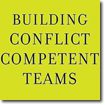
 |
By Bob Clark
February 19, 2009
Building Conflict Competent Teams by Craig Runde and Tim Flanagan.
Jossey-Bass, A Wiley Imprint, San Francisco, Calif., June 2008, 256 pages, $29.95.
This recent book delivers sound observations on strengthening the operation of teams and improving the outcomes of team efforts. The authors are experienced consultants on a variety of leadership issues, and the information they provide is well thought out. In addition to the academic observations, Runde and Flanagan make their points with clarity by offering examples from consulting experiences.
The core material is divided into three sections.
-¢ Creating the Right Climate: Attitudes, Trust, Safety, Behavioral Integration, Emotional Intelligence
-¢ Constructive Communications: Reflective Thinking and Delay Responding, Listen for Understanding, Perspective Taking, Expressing Emotions
-¢ Techniques for Staying on Track
The sections on creating the right climate and constructive communications do not carry much new information, but each offers insight and examples on what can go wrong and how to avoid the worst traps. While not new revelations, the packaging is good. The authors have created an excellent review of what leaders must do to manage effective teams that deliver superior outcomes.
The section on techniques for staying on track deserves some attention by any team leader. Among the suggested processes, the authors have included two worth closer study.
-¢ The application of mediation techniques in a team environment is worth exploration by a team leader trying to resolve fractious issues. The approach will require the leader to take a different look at the issues and reassess the advocacy of team members for various positions in a way that can be helpful.
-¢ A reframing technique through inquiry is described in the book. As is true with mediation, this approach takes the leader into a different role to examine the issues in a way that will strengthen the performance of the team.
The authors have developed a section on the special issues involved with global teams and virtual teams. Both environments are challenging, and the information provided will give the team leader help in applying techniques that will improve team performance. In addition, the book contains several checklists and assessment instruments that can help team leaders examine difficult situations with greater clarity.
At times, leaders may need to openly embrace the dynamic tension and conflict that can exist among team members, but the authors do not address this notion fully. It is a risky strategy, but if the value of the effort is one of high importance to the organization, it may be warranted. Pressing on the natural conflicts in the team can stretch team members to function at higher personal levels, thereby challenging the group to perform better and deliver significantly superior outcomes.
Bob Clark is the president of RWC Consulting LLC and has more than 30 years experience in labor-management relations. He provides consulting help in labor relations and is an adjunct professor at Concordia University in Ann Arbor.








